基础英语讲座20课(十八)
新概念英语第一册第20课课文及详解
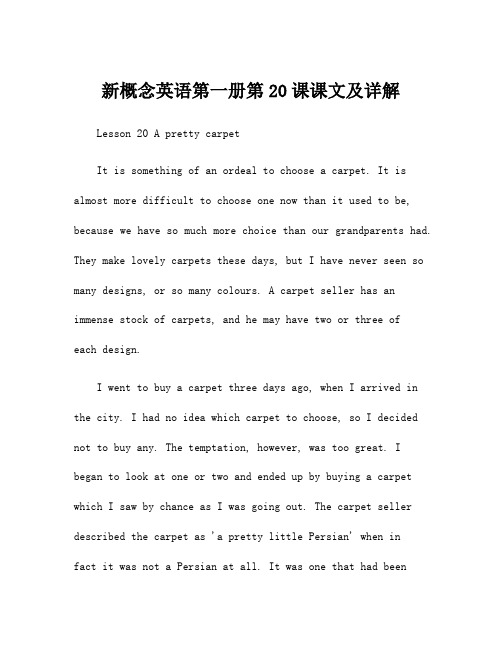
新概念英语第一册第20课课文及详解Lesson 20 A pretty carpetIt is something of an ordeal to choose a carpet. It is almost more difficult to choose one now than it used to be, because we have so much more choice than our grandparents had. They make lovely carpets these days, but I have never seen so many designs, or so many colours. A carpet seller has an immense stock of carpets, and he may have two or three ofeach design.I went to buy a carpet three days ago, when I arrived in the city. I had no idea which carpet to choose, so I decided not to buy any. The temptation, however, was too great. I began to look at one or two and ended up by buying a carpet which I saw by chance as I was going out. The carpet seller described the carpet as 'a pretty little Persian' when infact it was not a Persian at all. It was one that had beenmade in a factory an hour's drive away. The carpet seller would have called any carpet 'a pretty little Persian', but I was not deceived. I did not care what it was called; I was simply attracted by its design and colour. Nevertheless, the carpet seller had a habit of making everyone feel he had got something really special. On the way out, he put his hand on my shoulder and said, 'You've made a good choice, Sir!' I was still wondering whether I had, when I got it back to the hotel. As I was admiring it in my room, a friend of mine came in and admired it too. He asked me how much I had paid for it and I told him the price. 'I am the carpet seller in the city,' he said, laughing, 'but when I sell a carpet, I never tell people the price I paid for it!'【课文讲解】1. It is something of an ordeal to choose a carpet.【译文】挑选一张地毯,真是一场折磨。
新概念英语第四册Lesson 20课文音标版讲义
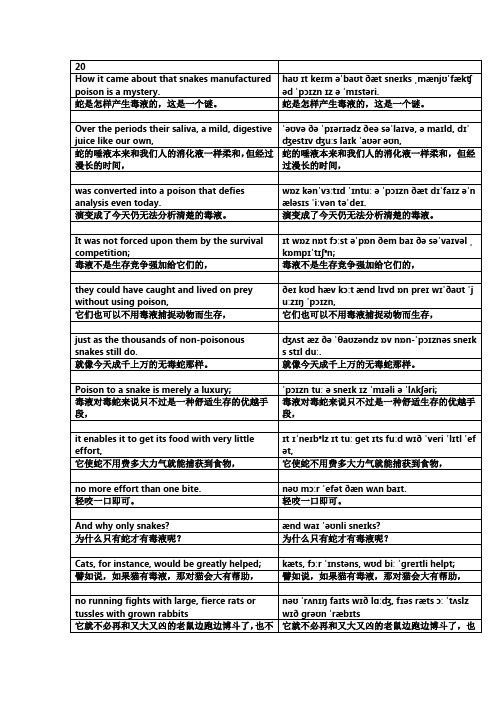
20How it came about that snakes manufactured poison is a mystery. haʊɪt keɪm əˈbaʊt ðæt sneɪks ˌmænjʊˈfækʧəd ˈpɔɪzn ɪz əˈmɪstəri.蛇是怎样产生毒液的,这是一个谜。
蛇是怎样产生毒液的,这是一个谜。
Over the periods their saliva, a mild, digestive juice like our own, ˈəʊvə ðəˈpɪərɪədz ðeə səˈlaɪvə, ə maɪld, dɪˈʤestɪv ʤuːs laɪk ˈaʊər əʊn,蛇的唾液本来和我们人的消化液一样柔和,但经过漫长的时间,蛇的唾液本来和我们人的消化液一样柔和,但经过漫长的时间,was converted into a poison that defies analysis even today. wɒz kənˈvɜːtɪd ˈɪntuːəˈpɔɪzn ðæt dɪˈfaɪz əˈn æləsɪs ˈiːvən təˈdeɪ.演变成了今天仍无法分析清楚的毒液。
演变成了今天仍无法分析清楚的毒液。
It was not forced upon them by the survival competition; ɪt wɒz nɒt fɔːstəˈpɒn ðem baɪ ðə səˈvaɪvəl ˌkɒmpɪˈtɪʃᵊn;毒液不是生存竞争强加给它们的,毒液不是生存竞争强加给它们的,they could have caught and lived on prey without using poison, ðeɪ kʊd hæv kɔːt ænd lɪvd ɒn preɪ wɪˈðaʊt ˈj uːzɪŋˈpɔɪzn,它们也可以不用毒液捕捉动物而生存,它们也可以不用毒液捕捉动物而生存,just as the thousands of non-poisonous snakes still do. ʤʌst æz ðəˈθaʊzəndz ɒv nɒn-ˈpɔɪznəs sneɪk s stɪl duː.就像今天成千上万的无毒蛇那样。
新概念英语第二册第20课

新概念英语第二册第20课新概念英语第二册第20课教案一、教学内容:1.复习上节课所学内容并听写2.讲解第20课单词及课文知识点3.完成课堂练习并讲解二、教学目标:1.掌握所讲单词、短语及句型的用法2.掌握关键语言知识点和难点三、授课过程:1.生词和短语①catch (caught, caught) vt. 抓到catch fish 钓鱼,捕鱼catch a thief 抓住小偷catch the bus 赶公交车←→miss the bus 错过公交车②fisherman n. 钓鱼人,渔民fish →fisherman (pl. fishermen)fish n. 鱼[C]1) fish 鱼[pl.] 单复数同形2) fishes 不同种类的鱼③boot n.靴子a pair of boots一双靴子④waste vt./n.浪费1) waste vt. 浪费eg. Don’t waste your time, money and energy. 不要浪费你的时间,金钱和精力。
2) waste n. 浪费a waste of 对…的浪费eg. It’s a waste of time. 这简直是浪费时间。
⑤realize v. 意识到real adj. 真的reality n. 现实1) 认识到,意识到(不用于被动语态,不用于进行时态,人做主语)eg. She realized that he was lying. 她意识到他正在说谎。
2) vt. 实现(计划等)(可用于主动,也可用于被动语态)realize one’s hope 实现某人的希望rea lize one’s dream 实现某人的梦想realize one’s plan 实现某人的计划eg. He realiaed his dream at last. 他终于实现了自己的梦想。
→ His dream was realized at last.2. 课文讲解I often fish for hours without catching anything.without prep. 没有prep.+ n./v.—ing / pron.eg. He went out without saying anything. 他一言不发就走了。
新概念英语第二册Lesson20Onemaninaboat讲义
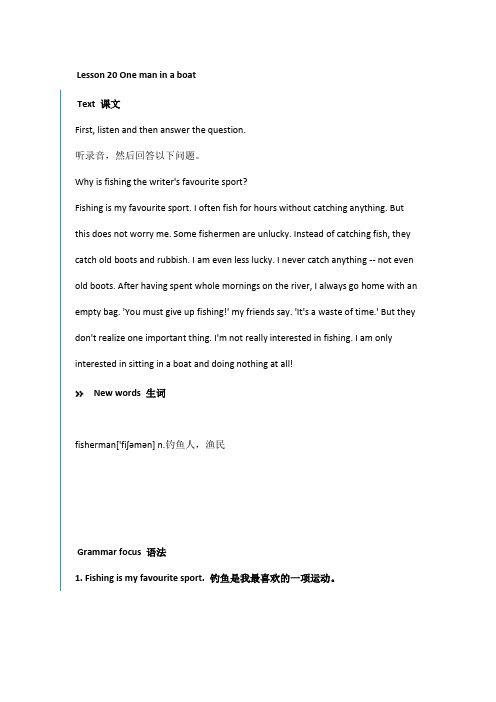
Lesson 20 One man in a boatText 课文First, listen and then answer the question.听录音,然后回答以下问题。
Why is fishing the writer's favourite sport?Fishing is my favourite sport. I often fish for hours without catching anything. But this does not worry me. Some fishermen are unlucky. Instead of catching fish, they catch old boots and rubbish. I am even less lucky. I never catch anything -- not even old boots. After having spent whole mornings on the river, I always go home with an empty bag. 'You must give up fishing!' my friends say. 'It's a waste of time.' But they don't realize one important thing. I'm not really interested in fishing. I am only interested in sitting in a boat and doing nothing at all!New words 生词fisherman['fiʃəmən] n.钓鱼人,渔民Grammar focus 语法1. Fishing is my favourite sport. 钓鱼是我最喜欢的一项运动。
六年级下册冀教版英语20课讲解

六年级下册冀教版英语20课讲解Lesson 20 of Grade 6 Volume II of the Jilin Edition English textbook is titled "At the Weekend." In this lesson, students learn how to talk about their weekend activities using the simple past tense. The lesson also introduces new vocabulary related to weekend activities, such as "go camping," "go hiking," and "have a picnic."To begin with, students are presented with a dialogue between two friends, Tom and Kate, discussing what they did over the weekend. Tom went camping with his family, while Kate went hiking with her friends. The dialogue serves as a model for students to practice forming sentences in the simple past tense using the verbs "went" and "had."After listening to and reading the dialogue, students are then tasked with completing a series of exercises to reinforce their understanding of the new vocabulary and grammar structures. These exercises may include multiple-choice questions, fill-in-the-blank sentences, and matching activities.In addition to the main focus on grammar and vocabulary, Lesson 20 also includes a section on speaking and listening practice. Students are encouraged to work in pairs or smallgroups to discuss their own weekend activities using the target language. This allows for peer interaction and increases students' confidence in using English to communicate.Overall, Lesson 20 of Grade 6 Volume II of the Jilin Edition English textbook provides students with the opportunity to practice using the simple past tense in the context of discussing weekend activities. By the end of the lesson, students should be able to confidently talk about what they did over the weekend and understand similar conversations with their peers.。
许国璋电视英语教学第一册第二十课(含旧课文)
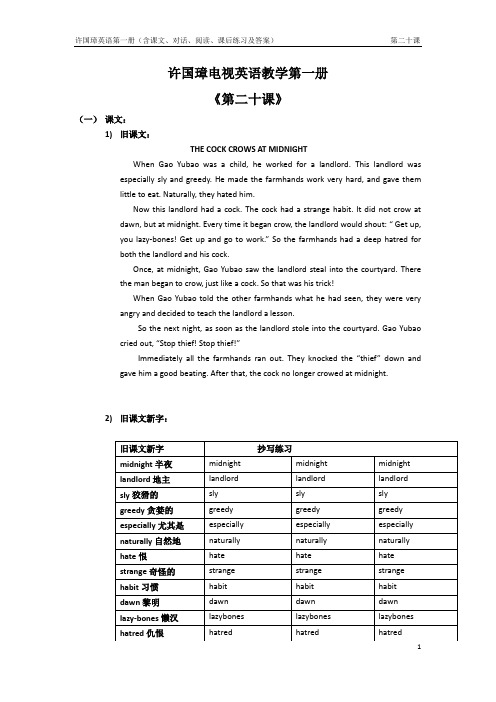
许国璋电视英语教学第一册《第二十课》(一)课文:1)旧课文:THE COCK CROWS AT MIDNIGHTWhen Gao Yubao was a child, he worked for a landlord. This landlord was especially sly and greedy. He made the farmhands work very hard, and gave themlittle to eat. Naturally, they hated him.Now this landlord had a cock. The cock had a strange habit. It did not crow at dawn, but at midnight. Every time it began crow, the landlord would shout: “ Get up,you lazy-bones! Get up and go to work.” So the farmhands had a deep hatred forboth the landlord and his cock.Once, at midnight, Gao Yubao saw the landlord steal into the courtyard. There the man began to crow, just like a cock. So that was his trick!When Gao Yubao told the other farmhands what he had seen, they were very angry and decided to teach the landlord a lesson.So the next night, as soon as the landlord stole into the courtyard. Gao Yubao cried out, “Stop thief! Stop thief!”Immediately all the farmhands ran out. They knocked the “thief”down and gave him a good beating. After that, the cock no longer crowed at midnight.2)旧课文新字:3)新课文:LADY GODIVA戈黛娃夫人Godiva was the beautiful wife of the Lord of Coventry. She lived in the eleventh century.According to an old legend, the Lord taxed the people of Coventry heavily and unjustly. If they did not pay those cruel taxes, they were thrown into prison.戈黛娃夫人是考文垂勋爵的美丽妻子。
精通版小学英语四年级上册lesson 20课文讲解
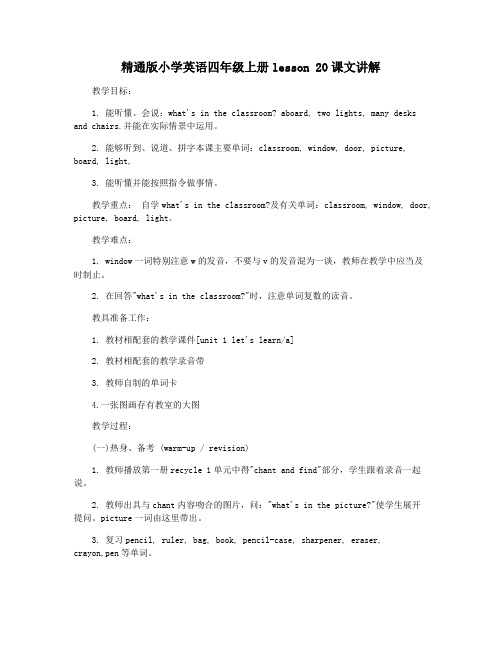
精通版小学英语四年级上册lesson 20课文讲解教学目标:1. 能听懂、会说:what's in the classroom? aboard, two lights, many desks and chairs.并能在实际情景中运用。
2. 能够听到、说道、拼字本课主要单词:classroom, window, door, picture, board, light,3. 能听懂并能按照指令做事情。
教学重点:自学what's in the classroom?及有关单词:classroom, window, door, picture, board, light。
教学难点:1. window一词特别注意w的发音,不要与v的发音混为一谈,教师在教学中应当及时制止。
2. 在回答"what's in the classroom?"时,注意单词复数的读音。
教具准备工作:1. 教材相配套的教学课件[unit 1 let's learn/a]2. 教材相配套的教学录音带3. 教师自制的单词卡4.一张图画存有教室的大图教学过程:(一)热身、备考 (warm-up / revision)1. 教师播放第一册recycle 1单元中得"chant and find"部分,学生跟着录音一起说。
2. 教师出具与chant内容吻合的图片,问:"what's in the picture?"使学生展开提问。
picture一词由这里带出。
3. 复习pencil, ruler, bag, book, pencil-case, sharpener, eraser,crayon,pen等单词。
4. 鼓励学生用以上单词搞猜谜练,例如:what's in the bag? what's in thepencil-case ?5. 在学生回答出问题后,教师可再追问:how many pencils/pens…?使学生能用复数进行回答。
新概念英语L1辅导讲义Lesson 20 One man in a boat 教师版
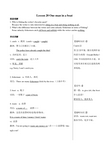
Lesson 20 One man in a boat阅读理解1. Why is fishing the writer’s favorite sport?Because the writer is only interested in sitting in a boat and doing nothing at all.2. What’s the difference between the writer and some unlucky fishermen in terms of fishing? Some unlucky fishermen catch old boots and rubbish while the writer catches nothing.单词详解1. catch v. 抓到(catch – caught – caught)翻译:警方已经抓住了小偷。
The police have already caught the thief.v. 及时赶到,赶上词组:catch the train 赶上火车v. 听见,理解e.g. Sorry, I can’t catch you.2. fisherman n. 钓鱼人,渔民填空:There are many fishermen (fish) by the river.(上海中考)3. boot n. 靴子词组:一双靴子a pair of boots4. waste n. 浪费用法:a waste of …浪费……翻译:这是在浪费时间/金钱/食物/水。
It is a waste of time / money / food / water.vt. 浪费翻译:I’m not going to waste any money on(在……上浪费钱)this ugly coat! 【趣味知识1】Catch-22第22条军规。
源自美国作家约瑟夫•海勒(Joseph Heller)1961年出版的同名小说。
- 1、下载文档前请自行甄别文档内容的完整性,平台不提供额外的编辑、内容补充、找答案等附加服务。
- 2、"仅部分预览"的文档,不可在线预览部分如存在完整性等问题,可反馈申请退款(可完整预览的文档不适用该条件!)。
- 3、如文档侵犯您的权益,请联系客服反馈,我们会尽快为您处理(人工客服工作时间:9:00-18:30)。
基础英语讲座20课(十八)Which of these do you think is the mostuseful invention?Which of these do you think is the most useful invention?你认为哪一种是最有用的发明。
Do you think 语法上通常认为是插入语,意思是说,去掉它们以后,句子仍然成立。
(如果认为you 是主语,think 是谓语,其它成份是宾语从句也有道理)。
例如:Who do you think is over there?你认为谁在那儿呢?What do you think has happened?你认为发生了什么事情了?He was always trying out new ideas.He was always trying out new ideas.他总是在试验一些新的想法。
Be always doing 表示“总是在做着…”表达说话人的一种感情,如赞扬或者批评。
例如:My students are always studying hard.我的学生总是在努力学习。
He is always making some mistakes.他总是在犯一些错误。
His father saw him sitting on some eggs.His father saw him sitting on some eggs.他父亲看到他正坐在一些鸡蛋上。
See sb.doing 表示“看见某人正干某事”。
同义词组see sb.do 则表示“看见某人做了某事”。
类似see 的动词还有hear,feel,watch。
例如:I saw him get on the bus.我看见他上了车了。
I saw a girl reading in the park.我看见一个女孩在公园里读书。
I heard someone singing in the classroom.我听到有人在教室里唱歌。
The teacher could not answer all of them.The teacher could not answer all of them.老师不可能回答所有的问题。
句中否定词not 和all在一起,构成不完全否定。
例如:All the students are not here.所有的学生没都来。
I didn't take all of them.我没全拿走。
So he wanted to send Tom away from school.So he wanted to send Tom away from school.所以他想让汤姆离开学校。
To send …是一动词不定式。
作want 的宾语。
动词不定式是原形动词前加一to。
动词不定式在句中可作宾语或宾语补足语等。
例如:I want to buy some books.我想买几本书。
He came here to help me.他来帮助我。
I asked him to turn it down.我让他把收音机关小。
She sent for a doctor.She sent for a doctor.她派人去请大夫。
Sent for 表示“派人把某人请来。
Sent 是send 的过去式。
Send 表示“派遣”。
例如:Her classmate was ill and she sent for the doctor.她的同学病了,所以她派人请了大夫。
Who sent you here?谁派你来的?Could you look after her for me while we're away?Could you look after her for me while we're away.你能不能在我们不在的时候照看她?while 表示“当…的时候”,与while 同义的词还有when,as,as soon as.其中when 表示“当…的时候”,句中的动作时间可以是一时间点,as 表示“…一边…一边”,as soon as 表示“一…就…”。
例如:I feel happy while I live here these days.这些日子我住这儿感到很愉快。
The students are reading when the teacher came in?老师进来时,学生正在读书。
They work as they sing.他们一边唱歌一边工作。
Tell him about it as soon as he comes back.他一回来就告诉他。
They and the children were filling their bags with clothes and other things. They and the children were filling their bags with clothes and other things.他们和孩子们正在往行李箱内装衣服和其它东西。
Fill 是动词,表示“装满…”,fill…with…表示“用…装”,它的同义词是full,full 是形容词,表示“满的”,be full of 表示“充满着…”。
例如:How can I fill all these books into one bag?我怎么能把这些书放入一个包里?Our classroom is full of flowers.我们的教室充满了鲜花。
Make sure you've got the air tickets.Make sure you've got the air tickets.检查一下你们是否拿好了票。
Make sure 表示“弄清楚”,“查明”,后接宾语从句或of 短语。
be sure 则表示“一定要”,“不要忘记”,“肯定”。
例如:Make sure if he is in the classroom.检查一下他是否在教室。
Be sure to tell me about it as soon as you know it.只要你知道了,一定要告诉我。
I am sure he can catch the bus.我敢肯定他能赶上公共汽车。
He won't be back until January.He won't be back until January.他到一月份才回来。
Until 表示“一直到…时为止”,后接短语或时间状语从句。
在否定句中,可译成“直到…时才…”,until 和till 一样,可互用。
例如:I'll stay here until tomorrow.我要在这儿等到明天。
I'll study tonight until it is eleven o'clock.今晚我要学到十一点钟。
I didn't understand until you tell me.直到你告诉我才明白。
Stay here and wait for me till I come back.呆在这儿等着我回来。
Is she very unhappy without me?Is she very unhappy without me?我不在她是否不愉快。
Without…是一介词,表示“没有…的情况下”,常用来表示伴随情况,假设等。
例如:I can't do it well without your help.没有你的帮助我就干不好。
We could do nothing without light.没有电,我们什么也干不成。
He went out without a word.他一句话也没说就出去了。
Everybody here is busy getting ready for it.Everybody here is busy getting ready for it.在这儿大家都为圣诞节做准备。
Be busy doing表示“忙于做...”,也可以写成be busy with …,后接名词。
例如:The students are busy cleaning the classroom.学生正忙于打扫教室。
Are you busy with the homework?你在忙作业吗?Have you heard from him?Have you heard from him?你收到过他的信吗?hear from …表示“收到…的信”,相当于have a letter from him 。
例如:I heard from him last week.我上周收到他一封信。
I haven't heard from him since he left.只从他走后,我没收到他的信。
I had a letter from my sister.我收到我妹妹的一封信。
The children are no longer young.The children are no longer young.孩子们不再年青了。
No longer 表示“再也不”,用作状语,也可以写成not…any longer 。
例如:He can do it no longer.他再也干不成了。
I'll come here no longer.我再也不来了。
I won't help you any longer.我再也不会帮助你了。
They put small presents in each other's stockings.They put small presents in each other's stockings.他们都在对方的袜子里放了小礼品。
Each other 表示“互相”,用于两人之间。
例如:We don't know each other.我们互相都不认识。
We study each other and help each other.我们互相学习互相帮助。
You are never too old to enjoy Christmas Day.You are never too old to enjoy Christmas Day.你总不会因年纪大了而不喜欢圣诞节。
Too…to do…表示“太…以致不能做…”。
例如:He is too old to go to school.他太老了,不能去学校了。
The box is too heavy for me to carry it.箱子太大了,我搬不动。
